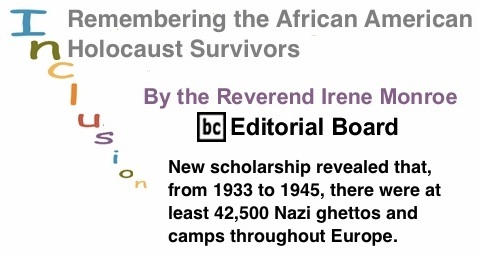
 yyyyy
yyyyy


This week,
April 8-12, marks the 27th annual observance of Holocaust Memorial Week. The
week is about remembering not only the 6 million Jews murdered but also
remembering the millions of allies, martyrs and victims who survived Nazi
Germany’s reign of brutality.
The enormity
of the mass slaughtering of Jews that took place - in ghettos, slave labor
sites, concentration camps, prisoner-of-war camps, brothels filled with sex
slaves and killing factories - is still being discovered as documents are
unearthed. New scholarship revealed that, from 1933 to 1945, there were at
least 42,500 Nazi ghettos and camps throughout
Thank goodness
the stories of the millions of allies, martyrs and victims who survived Nazi
Germany continue to be told.
On April
11th, City of
In 1941, Kr�sa was on the first train to the Theresienstadt
ghetto in Terez�n, now known as the
Missing, however, from the
annals of history are the documented stories and
struggles of African Americans, straight and “queer.” Valaida
Snow, captured in Nazi-occupied
Born in
In pre-Hitler
Although laws against
lesbianism had not been codified, and lesbians were not criminalized for their
sexual orientations as gay men were, lesbian German women were nonetheless
viewed as a threat to the Nazi state and were fair game during SS raids on
lesbian bars, sentenced by the Gestapo, sent to concentration camps, and
branded with a black triangle. In fact, any German woman, lesbian, prostitute
or heterosexual, not upholding her primary gender role - “to be a mother of as
many Aryan babies as possible” - was deemed anti-social and hostile to the
German state.
Because Nazis could not
discern between the sexual affection and social friendship between straight and
lesbian women, over time they dismissed lesbianism as a state and social
problem, as long as both straight and lesbian women carried out the state’s
mandate to procreate.
Nazi Germany’s
extermination plan of gay men is a classic example of how politics informed
their science. Paragraph 175 of the German Criminal Code differentiated between
the types of persecution non-German gay men received from German gay men
because of a quasi-scientific and racist ideology of racial purity. “The polices of persecution carried out toward non-German
homosexuals in the occupied territories differed significantly from those
directed against Germans gays,” wrote Richard Plant in The Pink Triangle: The Nazi War Against Homosexuals. “The Aryan
race was to be freed of contagion; the demise of degenerate subjects peoples was
to be hastened.”
Hans J. Massaquoi, former Ebony
Magazine editor, and the son of an African diplomat and white German
mother, in his memoir Destined to Witness: Growing Up Black in Nazi Germany, depicts a life of privilege
until his father returned to his native
There was no systematic
program for elimination of people of African descent in Nazi Germany from 1933
to 1945 because their number were few, but their abuses in German-occupied
territories, like the one in which Snow was captured, were great and
far-reaching.

BlackCommentator.com Editorial Board member and Columnist, the Rev. Irene Monroe, is a religion columnist, theologian, and public speaker. She is the Coordinator of the African-American Roundtable of the Center for Lesbian and Gay Studies in Religion and Ministry (CLGS) at the Pacific School of Religion. A native of Brooklyn, Rev. Monroe is a graduate from Wellesley College and Union Theological Seminary at Columbia University, and served as a pastor at an African-American church before coming to Harvard Divinity School for her doctorate as a Ford Fellow. She was recently named to MSNBC’s list of 10 Black Women You Should Know. Reverend Monroe is the author of Let Your Light Shine Like a Rainbow Always: Meditations on Bible Prayers for Not’So’Everyday Moments. As an African-American feminist theologian, she speaks for a sector of society that is frequently invisible. Her website is irenemonroe.com. Click here to contact the Rev. Monroe.





